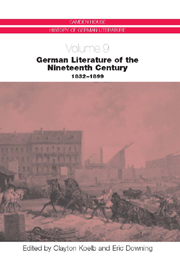Book contents
- Frontmatter
- Contents
- Illustrations
- Introduction
- Part I Contexts
- Part II Movements
- Part III Genres
- The Absence of Drama in Nineteenth-Century Germany
- The Nineteenth-Century German Novel
- Between Sentimentality and Phantasmagoria: German Lyric Poetry, 1830–1890
- Richard Wagner: Opera and Music Drama
- Part IV Bibliographical Resources
- List of Primary Sources
- Selected Secondary Works Cited
- Notes on the Contributors
- Index
The Absence of Drama in Nineteenth-Century Germany
from Part III - Genres
Published online by Cambridge University Press: 05 February 2013
- Frontmatter
- Contents
- Illustrations
- Introduction
- Part I Contexts
- Part II Movements
- Part III Genres
- The Absence of Drama in Nineteenth-Century Germany
- The Nineteenth-Century German Novel
- Between Sentimentality and Phantasmagoria: German Lyric Poetry, 1830–1890
- Richard Wagner: Opera and Music Drama
- Part IV Bibliographical Resources
- List of Primary Sources
- Selected Secondary Works Cited
- Notes on the Contributors
- Index
Summary
The title of course puts me out on a limb, but in fact I would be prepared to argue that the assertion it presupposes is a relatively modest one. Under different circumstances I might have written on “The Absence of Drama in the Nineteenth Century.” This chapter attempts to cover both the broad theoretical and historical points that support that larger assertion, and the specific situation in German-speaking Europe, including three particularly interesting cases from German literature.
The Literary-Historical Context
“Nineteenth-century German drama,” as it is viewed by most German historians of literature, develops largely in relation to a central tradition of works in the manner of Schiller's verse plays and, at a further remove, supposedly in the manner of Shakespeare. But even while the principal upholders of this classical tradition, Franz Grillparzer (1791–1872) and Friedrich Hebbel (1813–1863), spent most of their careers in Vienna — although performances of Hebbel took place mainly in Germany, and Grillparzer refused to show his work to a supposedly ungrateful public after 1838 — Vienna is also the home of theatrical conventions that have nothing to do with the classical. Especially prominent is the tradition of Viennese popular comedy, which in the nineteenth century produced two significant dramatic types, the “Zauberstück” (magical or fantasy piece), represented mainly by Ferdinand Raimund (1790–1836), and the “Lokalstück” or “Lokalposse” (dialect farce), represented mainly by Johann Nestroy (1801–1862). Aspects of this whole complex of conventions, including the use of singing, still operate later in both the comic and the more or less tragic works of Ludwig Anzengruber (1839–1889).
- Type
- Chapter
- Information
- German Literature of the Nineteenth Century, 1832–1899 , pp. 157 - 182Publisher: Boydell & BrewerPrint publication year: 2005



